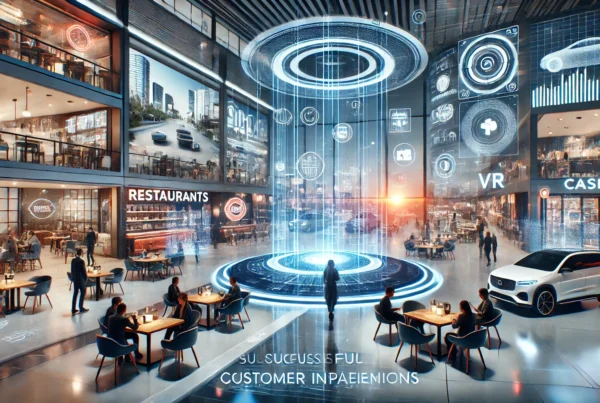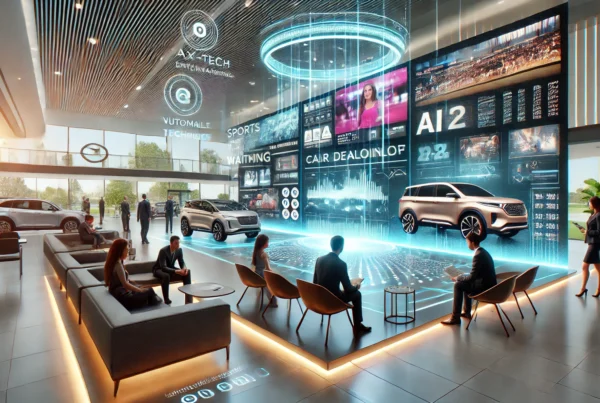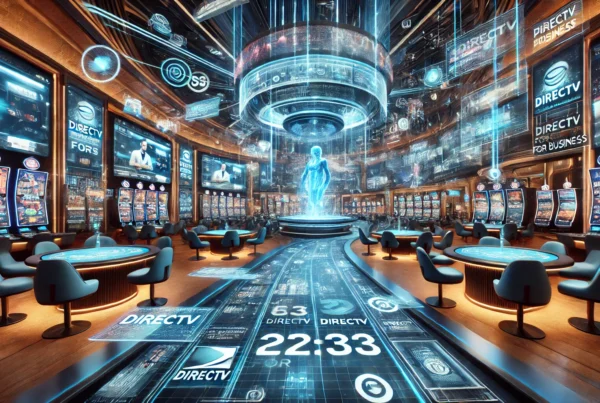In today’s fast-paced digital era, businesses are increasingly recognizing the power of leveraging technology for enhanced customer engagement. The ability to connect with customers through innovative tools is no longer a luxury but a necessity. For industries like hospitality, gaming, and automotive, staying ahead means adopting technology that not only meets but exceeds customer expectations.
Imagine walking into a restaurant where the ambiance is perfectly set by intelligent lighting and sound systems, or visiting a car dealership that uses augmented reality to showcase vehicles. These are not just futuristic concepts; they are the reality of 2025. As businesses strive to enhance customer satisfaction, leveraging technology becomes central to crafting memorable experiences.
For business owners and decision-makers, understanding how to implement these technological advancements is crucial. The key lies in identifying the right tools and techniques that align with your customer engagement strategies. Whether it’s through AI-driven analytics, personalized marketing tactics, or seamless integration of digital platforms, the potential for improved customer experiences is vast.
At Sports Direct, we are committed to providing solutions that empower businesses to harness the full potential of technology. Our mission aligns with helping industries like hospitality and gaming transform their customer interactions. By exploring the latest trends and case studies, you can discover how to create a competitive edge in your market.
Join us as we delve deeper into the strategies for tech-driven engagement and explore the innovative tools shaping the future of customer satisfaction. Stay tuned as we uncover the secrets to leveraging technology effectively in your business.
Understanding the Role of Technology in Customer Engagement
In today’s digital landscape, technology plays a pivotal role in transforming how businesses engage with their customers. By leveraging tools like AI, data analytics, and automation, companies can create personalized experiences that meet and exceed customer expectations. This shift is not just a trend; it’s a necessity for businesses aiming to remain competitive and relevant.
Successful integration of technology in customer engagement strategies can lead to improved satisfaction and loyalty. For instance, AI-driven chatbots provide 24/7 support, offering immediate assistance and freeing up human resources for more complex tasks. Similarly, data analytics allows businesses to gain deeper insights into customer behavior, enabling more informed decision-making and personalized marketing efforts.
AI and Data Analytics: Driving Personalized Experiences
Artificial Intelligence (AI) and data analytics are at the forefront of enhancing customer engagement. AI enables businesses to offer personalized messaging and real-time decision-making, significantly improving the customer experience. For example, AI-driven chatbots can handle routine inquiries, allowing human agents to focus on more intricate issues, thus increasing efficiency and satisfaction.
Data analytics further empowers businesses by providing insights into customer preferences and behaviors. This information helps tailor marketing strategies and product offerings to individual needs, fostering a more personalized and engaging customer journey. According to a report by McKinsey, companies that effectively use data analytics in their customer engagement strategies see a 10% to 20% increase in customer satisfaction.
Automation: Streamlining Customer Interactions
Automation is another critical component in enhancing customer engagement. By automating routine tasks, businesses can streamline operations and reduce human error, leading to faster response times and consistent service delivery. For instance, automated order processing can significantly cut down the time it takes for customers to receive their orders, boosting satisfaction.
Moreover, automation tools like Customer Relationship Management (CRM) systems help track and analyze customer interactions, providing valuable insights that can be used to improve service quality and customer relationships. A study by Salesforce found that businesses using CRM systems saw a 29% increase in sales and a 34% improvement in customer satisfaction.
Case Studies: Successful Technology Integration
Real-world examples of successful technology integration in customer engagement abound. One notable case is that of a leading automotive company that implemented virtual reality (VR) showrooms. This innovation allowed customers to explore vehicles in a virtual setting, enhancing their purchasing experience and increasing sales by 15%.
Another example is a hospitality business that utilized AI-driven analytics to personalize guest experiences. By analyzing customer data, the company was able to offer tailored recommendations and services, resulting in a 20% increase in repeat bookings. These case studies highlight the tangible benefits of leveraging technology for enhanced customer engagement.
Innovative Tools for Enhanced Customer Experiences
In the rapidly evolving digital landscape, businesses are leveraging technology to create immersive and personalized customer experiences. Emerging technologies such as Virtual Reality (VR), Augmented Reality (AR), and Customer Relationship Management (CRM) systems are at the forefront of this transformation. These tools not only enhance customer interactions but also streamline processes, leading to improved satisfaction and loyalty.
VR and AR offer customers unique, immersive experiences by allowing them to interact with products and services in a virtual environment. For instance, car dealerships are using VR to let potential buyers explore vehicles without leaving their homes. Similarly, AR applications in retail enable customers to visualize products in their own space before making a purchase, significantly enhancing the shopping experience.
Virtual and Augmented Reality: Immersive Customer Interactions
Virtual and Augmented Reality technologies are revolutionizing how businesses engage with their customers. By providing immersive experiences, these tools allow customers to interact with products in a way that was previously unimaginable. For example, a leading automotive company has implemented VR showrooms, enabling customers to explore car models virtually. This not only enhances the buying experience but also increases engagement and sales.
In the hospitality industry, AR is being used to enhance guest experiences by offering virtual tours of hotel facilities and nearby attractions. This technology not only enriches the customer journey but also helps businesses stand out in a competitive market. As VR and AR continue to evolve, their applications in customer engagement are expected to expand, offering even more innovative ways to connect with audiences.
CRM Systems: Streamlining Customer Relationship Management
Customer Relationship Management systems are essential tools for businesses aiming to optimize customer interactions and improve service delivery. By integrating CRM systems, companies can efficiently track and analyze customer data, leading to more personalized and targeted communication. This results in stronger customer relationships and increased loyalty.
For instance, CRM systems enable businesses to tailor marketing campaigns based on customer preferences and behaviors. A study by Salesforce found that businesses using CRM systems saw a 29% increase in sales and a 34% improvement in customer satisfaction. By leveraging CRM technology, companies can ensure that they are meeting customer needs and expectations effectively.
Real-World Applications: Success Stories in Technology Integration
Several businesses have successfully integrated innovative technologies to enhance customer experiences. A notable example is a hospitality company that used AI-driven analytics to personalize guest services. By analyzing customer data, the company provided tailored recommendations, resulting in a 20% increase in repeat bookings.
Another success story is a retail brand that implemented AR to allow customers to visualize products in their own environment before purchasing. This not only improved the shopping experience but also increased conversion rates. These examples highlight the tangible benefits of adopting innovative tools for customer engagement and satisfaction.
Future Trends in Technology and Customer Engagement
As we move further into the digital age, businesses must adapt to the rapidly evolving landscape of customer engagement. The integration of cutting-edge technologies is not just a trend but a necessity for companies aiming to stay competitive. In this section, we’ll explore the future trends in technology that are set to revolutionize customer engagement strategies.
By understanding and adopting these emerging trends, businesses can enhance their customer interactions, improve satisfaction, and ultimately, drive loyalty. From AI advancements to immersive experiences, the future holds exciting possibilities for those ready to embrace change.
AI-Driven Personalization
Artificial Intelligence (AI) continues to transform customer engagement by enabling hyper-personalized experiences. In the future, AI will become even more sophisticated, allowing businesses to predict customer needs with unprecedented accuracy. This will lead to more tailored marketing strategies and product recommendations, enhancing the overall customer experience.
For instance, AI algorithms can analyze vast amounts of data to identify patterns and preferences, enabling companies to offer personalized content and services. According to a report by Gartner, businesses that successfully implement AI-driven personalization could see up to a 15% increase in revenue by 2025.
Immersive Technologies: VR and AR
Virtual Reality (VR) and Augmented Reality (AR) are set to redefine customer engagement by providing immersive and interactive experiences. These technologies allow customers to engage with products and services in a virtual environment, enhancing their understanding and connection with the brand.
In the automotive industry, for example, VR showrooms enable potential buyers to explore car models without leaving their homes. Similarly, AR applications in retail allow customers to visualize products in their own space, significantly improving the shopping experience. As these technologies evolve, their applications in customer engagement are expected to expand, offering even more innovative ways to connect with audiences.
Blockchain for Enhanced Transparency
Blockchain technology is emerging as a powerful tool for enhancing transparency and trust in customer interactions. By providing a secure and immutable record of transactions, blockchain can help businesses build stronger relationships with their customers.
In industries like hospitality and gaming, blockchain can be used to ensure the authenticity of transactions and protect customer data. This not only enhances trust but also improves the overall customer experience by providing a transparent and secure platform for interactions.
As businesses look to the future, embracing these technological trends will be key to staying ahead in the competitive landscape. By leveraging AI, VR, AR, and blockchain, companies can create more engaging and satisfying experiences for their customers.
Harnessing Technology for Unmatched Customer Engagement
As we navigate the digital landscape of 2025, the importance of leveraging technology for enhanced customer engagement cannot be overstated. Businesses across industries like hospitality, gaming, and automotive are discovering that adopting innovative tools is no longer optional—it’s essential for creating memorable customer experiences. By integrating technologies such as AI, VR, and AR, companies can meet and exceed customer expectations, ensuring they remain competitive in a rapidly evolving market.
The benefits of adopting these technologies are clear. AI-driven analytics and chatbots offer personalized experiences and 24/7 support, while automation streamlines operations, reducing human error and enhancing service delivery. According to McKinsey, companies that effectively use data analytics in customer engagement strategies see a 10% to 20% increase in customer satisfaction. These advancements not only improve customer interactions but also foster loyalty and drive business growth.
- AI and Data Analytics: Enable personalized messaging and decision-making, enhancing customer satisfaction.
- Automation: Streamlines processes, leading to faster response times and consistent service.
- VR and AR: Provide immersive experiences, allowing customers to interact with products in new ways.
Looking to the future, technologies like blockchain are set to further transform customer engagement by enhancing transparency and trust. Businesses that embrace these trends will not only improve their customer interactions but will also gain a competitive edge. As we continue to explore these possibilities, it’s crucial to remain adaptable and open to innovation.
We encourage you to delve deeper into these technologies and explore how they can be implemented in your business. Visit our website for more insights and resources on leveraging technology for enhanced customer engagement. Share your thoughts and experiences in the comments, and let’s continue this conversation on how to harness technology for superior customer satisfaction.








